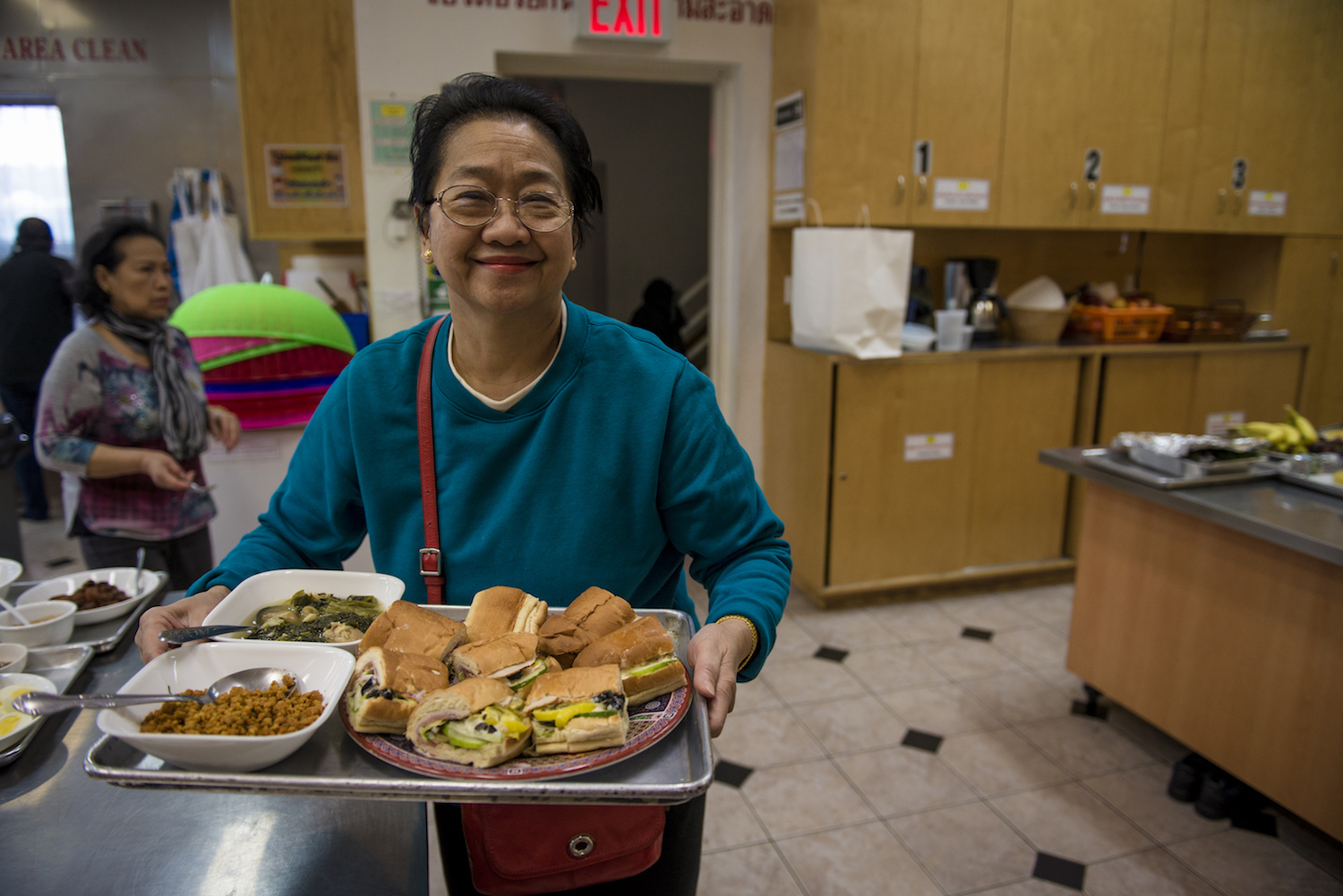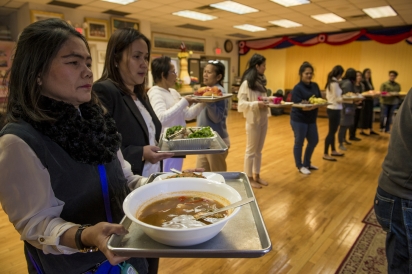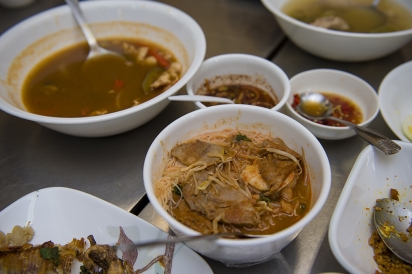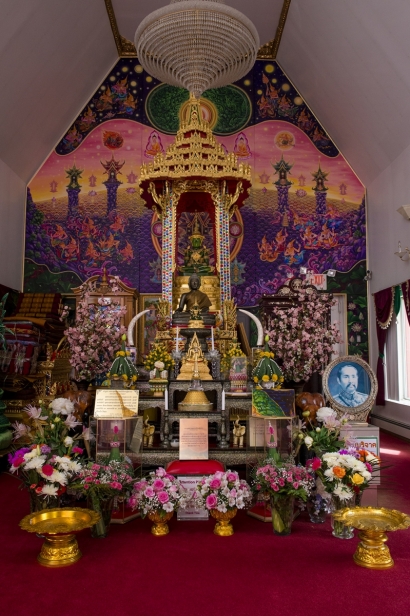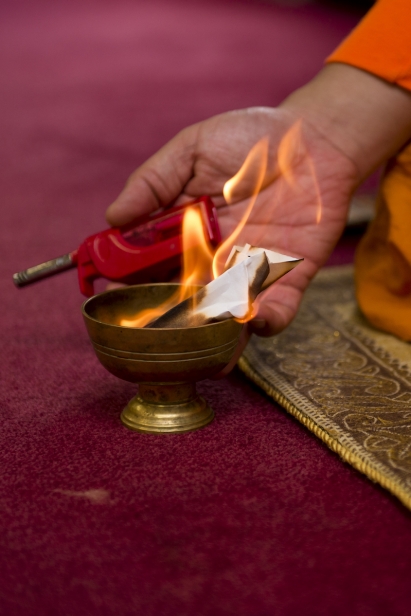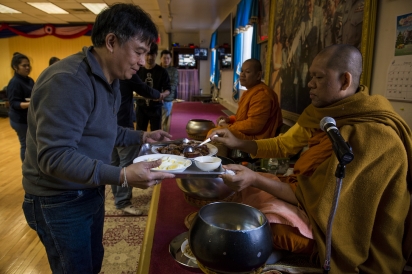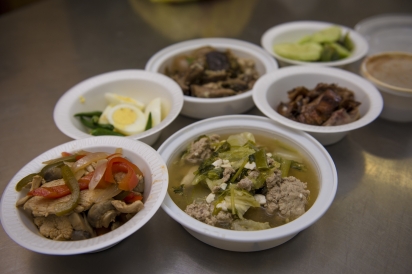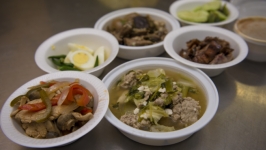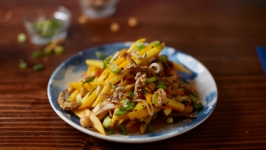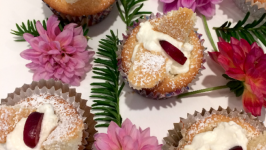Reaching Lao Nirvana: A Former Laotian Refugee Feeds Buddhist Monks at the Temple
When Jeannie Ongkeo arrived in New York City—a refugee from the Communist government in Laos—her sponsor gave her a choice: Which borough did she want to live in? It was March 1976 and Ongkeo, then 27, and her family had just spent eight months in a refugee camp in Thailand. She chose Queens.
“I didn't know anything at all [about New York],” Ongkeo recalled. “I just decided because the name sounded nice.”
Today Elmhurst is home to a huge Asian community. Chinese grocery stores face off at the major intersections. A huge Thai Buddhist temple is tucked in between apartment buildings on a quiet side street. But when Ongkeo moved into the neighborhood four decades ago, Elmhurst was primarily Dominican and Puerto Rican. The local markets didn’t yet stock lemongrass or fish sauce or baby eggplants.
Those first five years in New York, Ongkeo struggled to cook Lao food. Italian basil and carrots stood in for Thai basil and papaya. She made do with the fish sauce she could find in Chinatown. She was working too much to care anyway.
“You have to suffer a little bit,” she said. “It’s OK.”
Back in Laos, Ongkeo had grown up in her family’s kitchen. When she was 8, she started watching and helping her mother and grandmother cook. There was or lam—a special-occasion stew that draws its flavor from fresh herbs and deeply funky Lao fish sauce (padaek). And there was her family’s daily staple, tam mak hoong, a salty, tart papaya salad that accompanies many meals. At 9, Ongkeo started cooking for her family. Slowly she mastered her mother’s recipes, and then began experimenting.
“I like to cook my own style,” she said. “I can do recipes, but I always change something.”
In 1988 Ongkeo’s brother opened Mangez Avec Moi, an Asian fusion restaurant in Lower Manhattan. He didn’t know how to cook, so he turned to Ongkeo—who was working the front desk in a Manhattan hotel at the time. Ongkeo whipped up a menu of Americanized Thai and Vietnamese dishes. She’d never cooked professionally, but she figured out how to run a restaurant kitchen.
“When you love to eat, you know what to do,” she said.
She taught her brother her improvised recipes, then went back to her hotel job. A decade later, when he was too sick to keep working, she came back to the restaurant and took over the kitchen for good. Ongkeo worked 10-hour days, whipping up sugary mango chicken and sweet basil fried rice in Mangez Avec Moi’s tiny kitchen. But on the weekends she was cooking for a very different clientele: the monks at Wat Buddha Thai Thavorn Vanaram, the Buddhist temple in Ongkeo’s Elmhurst neighborhood. Jeannie was raised Buddhist and has vivid childhood memories of her mother and grandmother cooking for the monks at their local Buddhist temple in Laos. So it was natural for her to continue that tradition.
“When you go [to the temple], you have to bring something [to eat] with you,” she says. “It’s our culture.”
Feeding the monks is a daily ritual at the temple, one that Ongkeo continues today. Everyone brings a dish or two to share. The monks eat first, and then there’s a potluck meal for everyone else. Ongkeo and her brother closed Mangez Avec Moi last spring after their landlord sold the building. She was looking forward to relaxing at home with Lao soap operas and cooking for her family—and for the monks at the temple, of course. But retirement didn’t stick. Now she has a new restaurant in the works.
“I want to bring my Lao food to other people. I want people [here] to get real Lao food,” she said.
The menu will include drinking snacks like nam khaoo, noodle dishes like khao poon, and her personal favorite, or lam. (Her recipe is almost the same as her mother’s, “but different.”) The only hitch? Ongkeo needs to find a business partner to share the startup costs and the work. At 67, Ongkeo is still energetic; she laughs easily. She never intended to make her living cooking for other people, but she just can’t stay out of the kitchen.
“I love food. I love to eat,” she said. “That’s the problem.”


